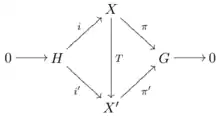Extension of a topological group
In mathematics, more specifically in topological groups, an extension of topological groups, or a topological extension, is a short exact sequence where and are topological groups and and are continuous homomorphisms which are also open onto their images.[1] Every extension of topological groups is therefore a group extension.
Classification of extensions of topological groups
We say that the topological extensions
and
are equivalent (or congruent) if there exists a topological isomorphism making commutative the diagram of Figure 1.

We say that the topological extension
is a split extension (or splits) if it is equivalent to the trivial extension
where is the natural inclusion over the first factor and is the natural projection over the second factor.
It is easy to prove that the topological extension splits if and only if there is a continuous homomorphism such that is the identity map on
Note that the topological extension splits if and only if the subgroup is a topological direct summand of
Examples
- Take the real numbers and the integer numbers. Take the natural inclusion and the natural projection. Then
- is an extension of topological abelian groups. Indeed it is an example of a non-splitting extension.
Extensions of locally compact abelian groups (LCA)
An extension of topological abelian groups will be a short exact sequence where and are locally compact abelian groups and and are relatively open continuous homomorphisms.[2]
- Let be an extension of locally compact abelian groups
- Take and the Pontryagin duals of and and take and the dual maps of and . Then the sequence
- is an extension of locally compact abelian groups.
Extensions of topological abelian groups by the unit circle
A very special kind of topological extensions are the ones of the form where is the unit circle and and are topological abelian groups.[3]
The class S(T)
A topological abelian group belongs to the class if and only if every topological extension of the form splits
- Every locally compact abelian group belongs to . In other words every topological extension where is a locally compact abelian group, splits.
- Every locally precompact abelian group belongs to .
- The Banach space (and in particular topological abelian group) does not belong to .
References
- Cabello Sánchez, Félix (2003). "Quasi-homomorphisms". Fundam. Math. 178 (3): 255–270. doi:10.4064/fm178-3-5. Zbl 1051.39032.
- Fulp, R.O.; Griffith, P.A. (1971). "Extensions of locally compact abelian groups. I, II" (PDF). Trans. Am. Math. Soc. 154: 341–356, 357–363. doi:10.1090/S0002-9947-1971-99931-0. MR 0272870. Zbl 0216.34302.
- Bello, Hugo J.; Chasco, María Jesús; Domínguez, Xabier (2013). "Extending topological abelian groups by the unit circle". Abstr. Appl. Anal. Article ID 590159. doi:10.1155/2013/590159. Zbl 1295.22009.